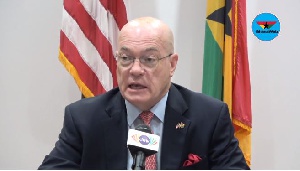In 2018, the former United States of America Ambassador to Ghana, Robert Jackson, disclosed that Ghana spent a whopping US$24 billion to resolve its erratic power disruption known as ‘dumsor’ in the country.
According to him, the expenditure which occurred from 2010 to 2016 had gone a long way to stifle the country’s economy.
To transform the ailing power sector, Robert Jackson revealed that the US government was investing US$498 million under the second Millennium Challenge Compact agreement.
"Part of that US$498 million includes nearly US$66 million to develop NEDCo [Northern Electricity Distribution Company] into an efficient and self-sustaining power utility - one that can spearhead economic growth in Northern Ghana," he said.
Read the full story originally published on February 4, 2016, on Ghanaweb below
Ghana lost more than 24 billion dollars between 2010 and 2016 as a result of insufficient power supply and outages, Mr Robert Jackson, the United States (US) Ambassador to Ghana, has said.
Mr Jackson, who was interacting with students of University for Development Studies (UDS) on Wa campus on Monday, said unreliable and inadequate power supply stifled economic growth.
He said US government's Power Africa Initiative formed part of efforts by America to help Ghana achieve its vision to develop a strong and efficient power sector.
Under the second Millennium Challenge Compact, he said, the US government was investing 498 million dollars to transform Ghana's power sector.
'Part of that 498 million dollars includes nearly 66 million dollars to develop NEDCo [Northern Electricity Distribution Company] into an efficient and self-sustaining power utility - one that can spearhead economic growth in Northern Ghana,' he said.
Mr Jackson said under the African Growth and Opportunity Act (AGOA) law, many goods from selected African countries, including many made in Ghana products, could be exported to the US free.
He said American customs experts regularly visits Ghana to ensure exporters know what goods qualify as duty free.
He said the US West African Trade and Investment Hub had partnered with Ghanaian apparel manufacturers to increase exports to the US from less than one million dollars in 2010 to more than 12 million dollars in 2017, making Ghana the largest West African apparel exporter to America.
'By the end of this year, we expect to boost Ghanaian apparel exports to nearly 30 million dollars annually and help put Ghana on the map as an international apparel producer', Mr Jackson said.
He said when Ghana attains reliable electricity supply, what it would need would be a healthy and educated workforce to maintain it.
He said that is why the US government supported initiatives by Ghana government to combat malaria, improve nutrition, maternal and child health as well as address HIV and AIDS.
Again, he said, it was based on this that they supported the construction of Community-based Health Planning and Services Compounds that brought health services closer to people.
Mr Sylvester Galaa, Acting Principal of Wa campus of UDS, said the Ambassador's interaction with the students created a rare opportunity for the university to obtain first-hand information on US Diplomatic Relations with Ghana.
He urged the students to take advantage of many opportunities provided by the US government, especially in areas of education, economic empowerment and leadership training, to develop themselves and contribute to national development.
Postgraduate and undergraduate students from Faculty of Integrated Development Studies, School of Business and Law, Faculty of Planning and Land Management attended the session.
Business News of Tuesday, 4 February 2020
Source: www.ghanaweb.com













